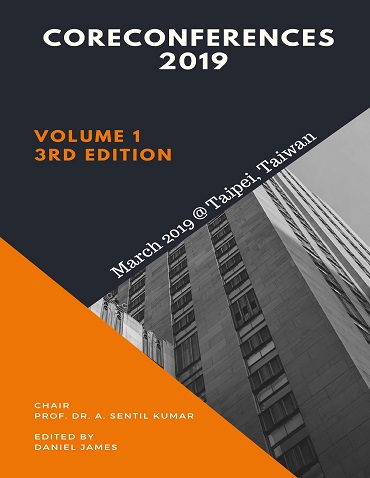- Publication Meta:Value
- Short Title:CC Batch A 2019
- Publisher:ASDF, India
- ISBN 13:978-93-88122-06-1
- ISBN 10:93-88122-06-2
- Language:English
- Type:Hard Bound - Printed Book
- Copyrights:CC Batch A Organizers/DCRC, London, UK
- Editor-in-Chief:Dr A Senthilkumar
- Conference Dates:20 - 21, March 2019
- Venue Country:Taipei, Taiwan
- Submitted Papers:227
- Acceptance Rate:8.51%
- Website:www.coreconferences.com
Welcome to ASDF Electronic Digital Library!
CoreConferences 2019
CoreConferences 2019
International Conference on Climate Change Adaptation and Multidisciplinary Issues 2019
Paper 012
A Case Study of Korean Dramas: Representation of Same Sexuality Differences and Their Imaginative Married Lives
Tsui Hoi Lee Keely1
1Hong Kong S.A.R., China
Abstract
As Lori (2013) notes, the word “gender” came into common use as an alternative to the word “sex” in the United States in the 1970s (Krieger, 2003). Using the word “gender” is a way for researchers and activists to counter the belief that our masculinity and femininity are biologically determined - a belief pervading the scientific and lay communities at the time (Krieger, 2003). The term “gender” distinguishes the set of learned expectations, behaviours, and attitudes about being a man or woman from our biologically determined traits - collectively termed our sex. In recent years, many scholars tend to discuss about the consuming and portraying formats through watching different Korean dramas. However, they never mention about the perspectives of East-Asian nationalities (Hong Kong against Korea) after consuming TV dramas. Readers can just figure out the consumption process but they will not know how the audiences actually think about the perspectives and ideologies which the Korean dramas have brought out. Also, most of the scholars just arguing against single gender issues (Feminism) and they simply talk about feminism and masculine perspectives of TV dramas from female audiences' eyes. For that reason, this paper mainly talks about how female audiences think about the feminism and masculine characters of Korean dramas. The discussions and findings are surrounding those questions: 1) What do the Korean dramas show different gender perspectives? 2) How do female audiences (20's-30's) compare the gender differences between Hong Kong and Korea through dramas? The paper will show out some social norms and cultural issues which the Korean dramas have mentioned, then the methodologies results are used to bring out the perspectives on feminism and masculine characters in order to point out the differences between Hong Kong and Korea.
Keywords
Author's Profile
Author profile can be generated and linked through our partners World Book of Researchers. To include your profile online Click Here. After it is approved, please email to edlib @ asdf.res.in to create a link with all the papers.
e-AID
CoreConferences.2019.012
Cite this Article as Follows
Tsui Hoi Lee Keely. A Case Study of Korean Dramas: Representation of Same Sexuality Differences and Their Imaginative Married Lives. International Conference on Climate Change Adaptation and Multidisciplinary Issues (2019): 07. Print.
© 2010 - by EDLIB .
All Rights Reserved.

